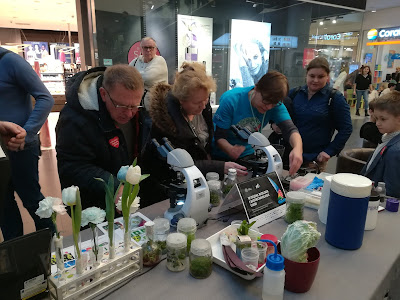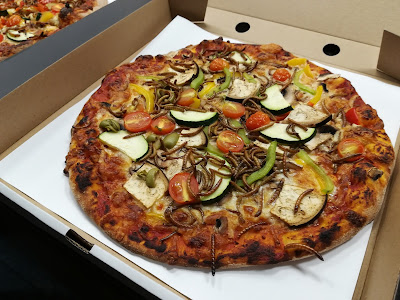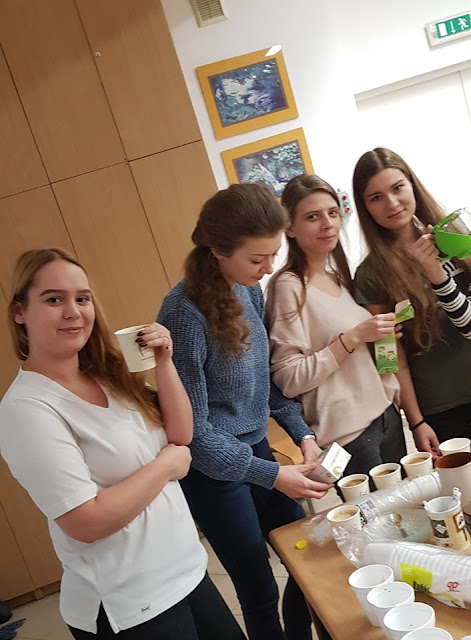Collaboration among scientists over a wide geographical area offers the possibility of planning innovative experiments within a relatively small budget. Such collaborative projects potentially combine outstanding research with networking, and thus can be very valuable for scientists at an early stage in their careers. As an example, the 1st Collaborative European Freshwater Science Project for Young Researchers, initially assembled a team of people from seven European Countries. The project later developed into a programme involving 47 early career scientists grouped in 16 teams from 11 European countries and performing measurements in 34 streams across Europe. In the 2nd FreshProject “Urban Algae”, around 100 early career researchers grouped in 30 sampling teams came together to conduct samplings in urban ponds covering 6 bioregions and developed a citizen survey to investigate citizen perception of urban ponds. The Collaborative European Freshwater Science Projects for Young Researchers are an excellent opportunity to join the European young researchers that share similar circumstances and concerns, them being the future of Freshwater Sciences in Europe
Proposals submitted to the present call should specify original research on any aspect of the ecology of inland waters. We are seeking to support research relying on the original and well‐designed use of inexpensive and simple methodology, and will favour multidisciplinary interactions among early career researchers from European countries. Thus, the evaluation will consider not only the scientific quality of the proposal, but especially the chances for promoting collaboration among European early career freshwater scientists, both by integrating them in the initial proposal and by offering opportunities for further integration for the project development. This is an `equal opportunity call’ which is open to all early career members of the limnological societies constituting EFFS. The EFFS‐federated societies listed below financially support this programme and kindly encourage the participation of their early career members.
Who is eligible?
Only researchers at Masters, PhD‐ or early Post‐Doc level (max. 2 years after PhD completion at the application deadline) can submit proposals and participate in the selected project. The proposers need to be members of the limnological societies within EFFS (the list of societies is available at http://www.freshwatersciences.eu/effs/index.asp?page=MEMBERS&Id=3 ). The final team, after the call for participation once the awarded project has been selected, must include at least one participant affiliated to each of the funding societies listed in the section “budget”.
Duration of the project
The project should be completed within two years after signing the grant agreement (see details in the section “Once the proposal is selected: Team assembly”); publication of scientific outputs is not required within this time frame although realistic plans for publication should be part of the proposal and the final report. If the team decides to publish their results in open‐access journals, the publication fee needs to be included in the total budget of the project proposal.
Budget
The budget available for this 3rd call is 8,300 euros (VAT included), which could be supplemented by funds provided by the participants or their institutions. This budget may cover consumables and > travel expenses, conference fees and publication costs. Salaries and non‐consumable materials cannot be paid by the budget. As mentioned above, the final team must include at least one participant affiliated to each of the 10 EFFS‐Federated funding Societies, which are the following:
- Association Française de Limnologie (France). Contribution: 1,000 €.
- Association of Austrian SIL‐Members: SIL‐Austria. Contribution: 500€.
- Associazione Italiana di Oceanologia e Limnologia (Italy). Contribution: 500 €.
- Asociación Ibérica de Limnología / Associação Ibérica de Limnologia (Spain and Portugal). Contribution: 1,500 €.
- Deutsche Gesellschaft für Limnologie e.V. (Germany). Contribution: 1,500€.
- Freshwater Biological Association (United Kingdom). Contribution: 1,000 €.
- Hrvatsko Udruženje Slatkovodnih Ekologa (Croatia). Contribution: 500 €.
- Magyar Hidrológiai Társaság (Hungary). Contribution: 300€.
- Polskie Towarzystwo Hydrobiologiczne (Poland). Contribution: 500€.
- Schweizerische Gesellschaft für Hydrologie und Limnologie / Société Suisse d'Hydrologie et de Limnologie / Società Svizzera di Idrologia e Limnologia (Switzerland). Contribution: 1,000 €.
In the absence of any participant affiliated to each of these societies in the final project team, the budget available may be reduced by the sum contributed by that society.
Rules
Each early career researcher can only submit one project. However, each project can have up to two proposing investigators (PIs; preferably, but not exclusively, from different countries), who will lead the project. The PIs and any number of co‐investigators make up the final project team. The PIs will be in charge of managing the project funds and shall report the main results and account of expenses to EFFS by the end of the project. Early Career researchers from across Europe will be invited to join the winning project after its acceptance, but the proposing investigators can also provide a list of potential participants from different European countries during the application. The PIs can belong to any of the EFFS affiliated countries but, as mentioned above, in order to attract the total sum available, the final team must include at least one participant affiliated to each funding society. In addition, other early career scientists from these or other affiliated societies can participate. The proposing investigators should, in any case, contact the EFFS‐Federated Society of these potential participants to ensure their effective affiliation.
How to apply
Early career researchers interested in submitting a proposal, from any society within EFFS, should complete the Project Proposal Form and send it by e‐mail to the contact persons listed below with “Early career Freshwater Project” in the subject line. This proposal will be made available to the EFFS‐federated Society they are affiliated by the EFFS chairperson through the EFFS‐Board representatives. The name of the Project Proposal Form file should include the first initial and last name of the proposing investigator (e.g. “FreshProject_ASilva”or “FreshProject_ASilva+WJohnson” without spaces or accents, with the 1st letter of each word in caps). The project proposal should be submitted in English as a single file containing the following sections:
- Title of the project, name(s) and affiliation(s) of the PI(s), up to five keywords.
- Project abstract in English (maximum length 3,000 characters including spaces, minimum font size 11pt).
- Project abstract in any official language of the EFFS‐Federated Society to which the IP(s) is/are affiliated (maximum length 3,000 characters including spaces, minimum font size 11pt).
- State of the art (maximum length 5,000 characters including spaces, minimum font size 11pt).
- Methods and development of the project, including project tasks and timetable (maximum length 20,000 characters including spaces, minimum font size 11pt).
- Impact of the project (maximum length 5,000 characters including spaces, minimum font size 11pt)
- Mandatory annexes are: (i) (a) letter(s) testifying that the proposing investigator(s) has (have) the support from the host(s) institution(s) to carry out the project (ii) (a) letter(s) of the EFFS‐federated Society to which they are affiliated testifying that the proposing investigator(s) are recognized as members of such Society (iii) CV for the applicant (s). The annexes should be merged at the end of the Project Form.
EFFS chairperson will acknowledge receipt of the application within three working days.
Submission deadline
The deadline for the submission of projects is 11:59 pm (GMT) of 15th February 2020, with the time
of the e‐mail header as proof of date. The applications must be sent simultaneously to: Antonio
Camacho (EFFS Chairperson) antonio.camacho@uv.es; as well as to all EFYR‐representatives: Nabil
Majdi nabil.majdi@uni‐bielefeld.de ; Clara Mendoza‐Lera clara.mendozalera@gmail.com; Zeynep
Ersoy zersoy@uevora.pt ; and Fredric Windsor fredric.Windsor@newcastle.ac.uk After the submission deadline, projects will be assembled and sent to the members of the panel for
evaluation.
Evaluation criteria
The panel will be constituted by five members to be nominated by the EFFS and EFYR boards, among renowned limnologists without any link with the presented projects. The projects submitted will be evaluated according to the following criteria:
- A. Scientific merit and innovation: Relevance to wider society and originality of the project proposed; Methodology for carrying out the project, including available instrumental resources at the centres where the research will be performed; Hypotheses to be tested and contribution to scientific knowledge; Potential scientific and societal outputs. (up to 40 points).
- B. The potential for interactions among young European researchers in different scientific disciplines and for enabling a balanced representation of participants from differing geographical, cultural and gender backgrounds. (up to 40 points).
- C. Feasibility of the work‐plan: Organization of the project in terms of the proposed objectives and resources. (up to 20 points).
Only one project will be selected. The decision of the panel will be announced not later than 30th
March 2020, by e‐mail sent to all young researchers who have submitted a project, as well as the
communication in the EFFS websites of the selected project, and the titles of proposals that were
not funded. Applicants will also receive an evaluation report addressing the criteria mentioned
above. The decision from the panel is final.
Once the proposal is selected: Team assembly
In order to reach out to early career researchers across Europe that could join the collaborative project, an invitation will be sent out via existing e‐mailing lists of the different EFFS‐Federated Limnological Societies, as well as by EFYR networks. Social media will be used to advertise the project further. Early career researchers wishing to participate should write a letter affirming that they are willing and able to participate in the project in the terms described in the proposal, and including the name of the EFFS‐Federated Society to which they are affiliated, which has to be checked by the IPs and the EFFS‐Board. Instructions on how to proceed to participate will be given > in the invitation e‐mail. Early career researchers that meet the eligibility criteria must contact with the proposing investigator(s) of the project, who will decide if the interested researcher qualifies to join the team according to the project needs. The final project team must be assembled by 30th May 2020. After the project team is created, the grant agreement will be signed and project will develop as specified in the Proposal Form, under the leadership of the PIs. The final amount to develop the project will be transferred to a specific bank account created to this
purpose by the PIs.
Dissemination of results
A final report, sufficiently detailed to reflect all results and conclusions, should be submitted (by email to the addresses listed in section “Submission deadline”) by PIs within three months of the end of the project. The report should have a maximum length of 20,000 characters with spaces and minimum font size 11pt, including Figures and Tables. This should also specify expected deadlines for dissemination (publication) of scientific outputs and detailed justification of the project expenses. The report can be distributed by the EFFS‐Federated Societies to their members, and will be available after distribution to the EFFS‐Board of Representatives. In parallel, at least one scientific paper should be submitted to an international peer‐reviewed journal no later than three years after the start of the project, covering complete or partial aspects of the research carried out. All participants in the research will be considered as potential co‐authors in the project outputs (except theses). Among the outputs of the project, we would expect at least one paper to be submitted to a peer‐reviewed journal and will require an oral presentation of preliminary results at SEFS‐12 to be held in Dublin, Ireland, in 2021, as well as of the final results at the first meeting of SEFS after the end of project. The EFFS and funders of this call must be acknowledged in any publication or conference presentation. Participants should also set up a blog featuring real‐time updates on project progress and activities, linked to the EFFS webpage and EFYR social media. Use of other social media and alternative outreach venues to provide visibility for the project and the call is encouraged.


















































